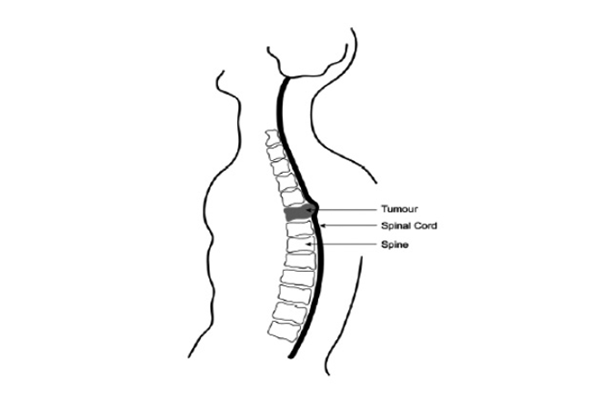Introduction
If you have a type of cancer that has spread to a bone, you need to know about spinal cord compression and the warning signs.
If you can recognise these early warning signs and get treated quickly, permanent damage may be avoided. The aim of this leaflet is to explain what to look out for, and what you should do if you have any warning signs.
What is spinal cord compression?
The spinal cord is a bundle of nerves that runs from the brain down the back. It is surrounded by the bones of the spine. The spinal cord provides nerves to the body including the bladder, arms and legs. If you have a tumour in the bones of the spine (vertebrae) or in the tissues around the spinal cord, it can cause pressure (compression) on the spinal cord. This can cause pain, altered sensation and weakness.

Spinal cord compression is not common and the risk of cord compression is small even if you have a secondary cancer in the spine.
What are the warning signs?
This depends on which part of the spine is affected. Pain may be present for some time before other symptoms develop. The warning signs can be any of the following:
- pain in one area of your spine that is severe, distressing or different from your usual pain
- pain down your leg or arm
- tingling – like electric shocks – down your spine into your legs, or arms and legs
- severe pain in your spine which changes when you lie down or stand up, lift or strain, wakes you at night, or stops you getting to sleep
- pain which starts in the spine and goes around the chest or abdomen
- new pain which gets worse and does not respond to painkillers
- stiffness or heaviness in your legs affecting your balance or walking
- numbness or changed sensation in your legs – this can also affect your lower body, chest or arms • weakness in your legs, or arms and legs
- bladder or bowel problems – loss of control (incontinence) or not being able to empty your bladder
What should I do if I develop any warning signs?
Get advice immediately: contact the hospital team where you usually go for your cancer follow-up clinics, your GP or Macmillan nurse. Describe your symptoms and explain that you are worried that you may have spinal cord compression and that you need to be seen urgently.
Don’t delay. Ring someone today even if it is the weekend or a holiday period.
What happens next?
- A doctor needs to examine you. If the doctor suspects that you may have spinal cord compression, they will advise you to stay flat in bed and a scan of your spine will be arranged urgently. This is usually an MRI scan, but you may have a different scan if this is not suitable for you.
- The doctor will prescribe steroids (dexamethasone) for you before or after the scan. Steroids reduce pressure and swelling around nerve tissue. If you are diabetic, or have had problems with steroids in the past, you should tell your doctor.
- Radiotherapy, surgery or chemotherapy are all options for treatment. The oncology team will discuss your symptoms with the specialist surgeons, should surgery be an option for you. This treatment option depends on the type of cancer, which part of the spine is affected and your general health. In any case, treatment should start as soon as possible after the scan.
- If you have cord compression, you will probably be admitted to your local hospital. You may need to be transferred to The Christie for radiotherapy or Salford Royal if you need surgery.
You will have to stay flat in bed until the doctors are satisfied that your spine is stable and it is safe to start walking again. You will get help with this from the physiotherapist. If your neck or top of the (cervical) spine is affected, you may also need to wear a collar to prevent damage to the spinal cord.
Spinal cord compression, if untreated or if there is a delay in treatment, can lead to permanent damage and even paralysis. Early diagnosis and treatment gives the best chance of preventing paralysis.
Remember to get help if you develop any warning signs. Seek immediate help if you have unexplained tingling, numbness or weakness in your arms and legs.
If you have any of the above symptoms
- Speak with a health professional, for example, your GP, oncologist, specialist nurse or a physiotherapist urgently.
- Tell them that you are worried about your spine and would like to be examined as soon as possible.
- Bring this information with you.
- Try to bend your back as little as possible.
For the doctor or healthcare professional
This patient has cancer and is therefore at risk of metastatic spinal cord compression (MSCC).
If they have any of the symptoms described in this information, please consider MSCC as a possible diagnosis. Discuss further management with the network MSCC Co-ordinator by phoning The Christie switchboard on 0161 446 3000 and ask to be put through to the MSCC service.
